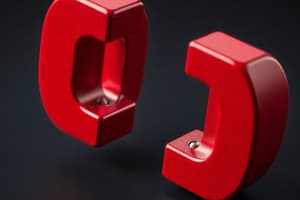Podcast
Questions and Answers
What is the significance of the pattern of iron filings around a bar magnet and a current-carrying solenoid?
What is the significance of the pattern of iron filings around a bar magnet and a current-carrying solenoid?
The pattern of iron filings suggests that the magnet has two poles similar to the positive and negative charge of an electric dipole, and permits us to plot the magnetic field lines.
What is the direction of the net magnetic field B at a given point on a magnetic field line?
What is the direction of the net magnetic field B at a given point on a magnetic field line?
The tangent to the field line at that point.
What can be inferred about the strength of the magnetic field B from the number of field lines crossing per unit area?
What can be inferred about the strength of the magnetic field B from the number of field lines crossing per unit area?
The larger the number of field lines crossing per unit area, the stronger is the magnitude of the magnetic field B.
Why do magnetic field lines not intersect?
Why do magnetic field lines not intersect?
How can one plot the magnetic field lines in a variety of ways?
How can one plot the magnetic field lines in a variety of ways?
What is the similarity between the poles of a magnet and an electric dipole?
What is the similarity between the poles of a magnet and an electric dipole?
What is the shape of the magnetic field lines of a magnet or a solenoid?
What is the shape of the magnetic field lines of a magnet or a solenoid?
How do the magnetic field lines around a bar magnet and a current-carrying solenoid compare to electric field lines of an electric dipole?
How do the magnetic field lines around a bar magnet and a current-carrying solenoid compare to electric field lines of an electric dipole?
How can a bar magnet be thought of in comparison to a solenoid?
How can a bar magnet be thought of in comparison to a solenoid?
What happens when a bar magnet is cut in half?
What happens when a bar magnet is cut in half?
What is the significance of the magnetic field lines around a solenoid and a bar magnet?
What is the significance of the magnetic field lines around a solenoid and a bar magnet?
How does the axial field of a finite solenoid compare to that of a bar magnet?
How does the axial field of a finite solenoid compare to that of a bar magnet?
What is the formula for the torque on a compass needle in a magnetic field?
What is the formula for the torque on a compass needle in a magnetic field?
What is the expression for the magnetic potential energy U_m of a magnetic needle?
What is the expression for the magnetic potential energy U_m of a magnetic needle?
Why can the zero of potential energy be fixed at one's convenience?
Why can the zero of potential energy be fixed at one's convenience?
In what way does a small compass needle demonstrate the properties of magnetic fields?
In what way does a small compass needle demonstrate the properties of magnetic fields?
Flashcards are hidden until you start studying
Study Notes
Magnetic Fields and Iron Filings
- Iron filings sprinkled on a sheet of glass over a short bar magnet show a pattern suggesting the magnet has two poles, similar to an electric dipole.
- One pole is designated the North pole and the other, the South pole, which point towards the geographic north and south poles when suspended freely.
Magnetic Field Lines
- The pattern of iron filings permits us to plot the magnetic field lines, which are a visual and intuitive realization of the magnetic field.
- Properties of magnetic field lines:
- Form continuous closed loops
- The tangent to the field line at a given point represents the direction of the net magnetic field B at that point
- The larger the number of field lines crossing per unit area, the stronger is the magnitude of the magnetic field B
- Do not intersect, for if they did, the direction of the magnetic field would not be unique at the point of intersection
Magnetic Field Lines of a Bar Magnet and a Solenoid
- The resemblance of magnetic field lines for a bar magnet and a solenoid suggests that a bar magnet may be thought of as a large number of circulating currents in analogy with a solenoid.
- Cutting a bar magnet in half is like cutting a solenoid, resulting in two smaller solenoids with weaker magnetic properties.
- The field lines remain continuous, emerging from one face of the solenoid and entering into the other face.
Analogy between a Bar Magnet and a Solenoid
- Moving a small compass needle in the neighbourhood of a bar magnet and a current-carrying finite solenoid shows similar deflections of the needle in both cases.
- The axial field of a finite solenoid resembles that of a bar magnet at large distances, making the analogy more firm.
Magnetic Moment of a Bar Magnet and a Solenoid
- The magnetic moment of a bar magnet is equal to the magnetic moment of an equivalent solenoid that produces the same magnetic field.
- The magnetic moment of a bar magnet can be demonstrated experimentally.
Torque and Magnetic Potential Energy
- The torque on a small compass needle in a magnetic field is given by τ = m × B, and in magnitude, τ = mB sinθ.
- The magnetic potential energy U_m is given by U_m = -m.B, where m is the magnetic moment of the needle and B is the magnetic field.
Studying That Suits You
Use AI to generate personalized quizzes and flashcards to suit your learning preferences.




